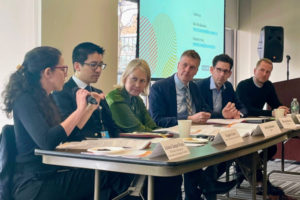As the world’s foremost multilateral organisation, the United Nations requires resources from its member states to function – but at times even experts find it difficult to understand how exactly the UN system is funded.

Copyright: FES
To provide an accessible account of this complex topic, Dr Max-Otto Baumann and Dr Sebastian Haug wrote a study on “Financing the United Nations: status quo, challenges, and reform options”. Commissioned by Friedrich-Ebert-Stiftung (FES), the study provides a succinct overview of key funding modalities, discusses how funding challenges undermine multilateralism, and identifies potential steps towards improving UN funding.
On 11 April, IDOS – together with the permanent mission of Germany to the United Nations and the FES New York office – hosted a study launch event in New York. More than 70 representatives of UN member states, UN entities, civil society representatives and experts gathered at the UN Church Center to discuss (the politics behind) UN funding patterns. While Max-Otto Baumann and Sebastian Haug presented the main contours of the study, Ulrika Modéer – UN Assistant Secretary-General and Director of the Bureau of External Relations and Advocacy at the UN Development Programme – as well as Eugene Chen (New York University) and Juliana Gaspar Ruas (UN Advisory Committee on Administrative and Budgetary Questions) discussed main findings and provided comments.
The ensuing discussion with the audience was lively and highlighted the broad interest in funding questions across UN constituencies. The study by Max-Otto Baumann and Sebastian Haug builds on recent IDOS work on different kinds of UN funding modalities, including voluntary earmarked and assessed contributions.

Schreibe einen Kommentar